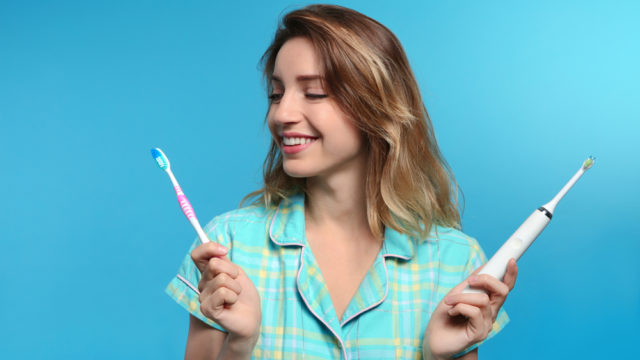
Article at a Glance
- Smart toothbrushes, or Bluetooth toothbrushes, are the next stage in electric toothbrushes with accompanying apps that are designed to help you improve your oral care routine.
- The two best smart toothbrushes on the market right now are the Oral-B Genius 9000/8000 and the Philips Sonicare FlexCare Platinum.
- Smart toothbrushes provide feedback on how you are brushing, not just the amount of time you’re spending, but how much pressure you’re applying and if you’re hitting all of the surfaces of your mouth.
Electric toothbrushes have been around for a while now. You can even purchase fun, character-covered electric toothbrushes for kids. It was only a matter of time before somebody presented something new, exciting, and modern into the world of electric toothbrushes – the smart toothbrush.
What is a Smart Toothbrush?
Smart toothbrushes, also called a Bluetooth toothbrush, connects with an app on your device to provide you with even more insight into your daily oral care routine. They look much like standard electric toothbrushes with sleek, usually white designs and rotating replaceable brush heads.
The main difference between smart toothbrushes and basic electric toothbrushes is the ability to connect to an app on your smartphone. Much like fitness trackers and smart watches, these toothbrushes connect via Bluetooth technology to provide you detailed information. As you brush, they take a 3D map of your mouth and can tell you everything from how much time you’re spending on your teeth to how much pressure you’re applying. Some of the smart toothbrush apps even show feature news stories, photos, and more to engage you while you brush.
What is the Best Smart Toothbrush?
As with most technology, experts have sampled the most popular products on the market to determine which smart toothbrush is the best overall model. You may find that their criteria differ from yours, but it’s a good bet that these tech experts will get you headed in the right direction for choosing the smart toothbrush that’s right for you.
The Oral-B Genius (9000 and 8000 models) and Philips Sonicare FlexCare Platinum both received high ratings due to excellent design and function. Some people noted that the apps were a bit confusing to get started on, but they had a lot of nice perks like extended battery life, easy USB charging, and reminders to change your brush head.
Do Smart Toothbrushes Improve Oral Health?
If you already have an electric toothbrush, you’re probably wondering why you need a new one with Bluetooth and an app. Is it really worth the money? Some of the biggest benefits from using smart toothbrushes are seen in the additional features that they offer.
- Smart toothbrushes have multiple sensors that can determine how much pressure you are using when brushing to identify if you are scrubbing too hard or not hard enough. They can even alert you if you’re applying too much pressure as you brush (some glow red to let you know).
- The smart toothbrush app may be the biggest benefit. It collects data over time and analyzes problems with your technique so you can make improvements to your routine and helps you set oral care goals.
- There is also a personal coaching feature that allows you to make note of a problem area and be reminded to pay special attention when brushing there.
- Smart toothbrushes have memory and can retain anywhere from 14 to 20 sessions, so if you’re on vacation or unable to sync with the app on your phone, you won’t lose that data.
- Most of the smart toothbrushes have different cleaning modes including a tongue cleaning mode and a whitening mode to help you focus on your personal level of clean.
- There are multiple alerts and reminders available to fine-tune your oral care routine including flossing and tongue scraping reminders.
The Bottom Line on Smart Toothbrushes
At the end of the day, it really depends on what you hope to get out of your toothbrush. How concerned are you about your oral care routines and how much help do you need to change them? Are you willing to watch your phone while you brush? Do you need real-time feedback every time you brush?
Keep in mind, while the toothbrush may be smart and able to alert you to problems with your routine (like too much pressure), they aren’t trained to detect real issues like cavities or inflamed gums. Even if you make the change to a smart toothbrush, you should still see your dentist every six months because no toothbrush is a replacement for a dentist. If it’s time for a check-up and professional teeth cleaning, contact the Jefferson Dental Care clinic nearest you to make an appointment.




